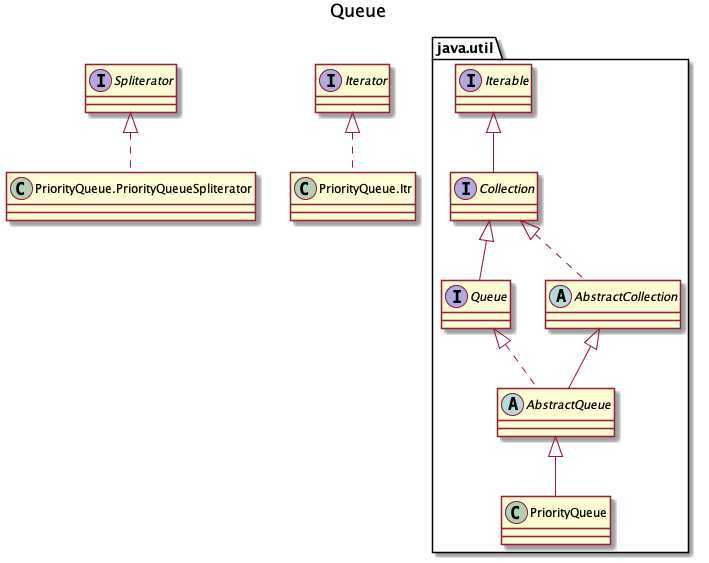
Binary Heap:
https://www.cnblogs.com/gaochundong/p/binary_heap.html
https://en.wikipedia.org/wiki/Binary_heap
https://www.youtube.com/watch?v=g9YK6sftDi0
- 不是完整的排序,仅关心父子节点的顺序,而不关心兄弟节点的顺序
- 堆,最大堆 or 最小堆, 意即:根节点是最大的元素或者最小的元素
- 借助于数组存储数据,从高层往下存储,从左到右存储。意即:第一个元素是根节点,后面紧跟其子节点;而后再紧跟两个子节点的四个子节点。
- 堆是一个完全二叉树。如果堆中有 n 个节点,则最小高度为 Θ(lg n)
- 调整堆时,从最后一个元素开始调整
- 最大堆插入元素: 将元素先放入底层的叶子节点,依次比较其父节点,若比父节点大,则与父节点交换位置;而后继续比较。直至比其父节点小。类似于不停的向上冒泡。。POPO
- 最大堆取出根节点后的重新排序:取最后一个叶子节点(最底层、从左到右),假设它为最大节点,因此放置于根节点,与左右子节点比较,若比子节点小,则与子节点交换位置,依次类推,直至比子节点大。 类似于不停的向下沉。。。DOWN
public class PriorityQueue<E> extends AbstractQueue<E>
implements java.io.Serializable {
private static final int DEFAULT_INITIAL_CAPACITY = 11;
/**
* Priority queue represented as a balanced binary heap: the two
* children of queue[n] are queue[2*n+1] and queue[2*(n+1)]. The
* priority queue is ordered by comparator, or by the elements‘
* natural ordering, if comparator is null: For each node n in the
* heap and each descendant d of n, n <= d. The element with the
* lowest value is in queue[0], assuming the queue is nonempty.
*/
transient Object[] queue; // non-private to simplify nested class access
}
| 方法 | 时间复杂度 | 备注 |
|---|---|---|
| off | O(log(n)) | |
| poll | O(log(n)) | |
| remove | O(log(n)) | |
| add | O(log(n)) | |
| remove(Object) | linear time | 底层为使用了indexOf,遍历整个数组 |
| contains(Object) | linear time | 底层为使用了indexOf,遍历整个数组 |
| peek | constant time | 取数组的第一个元素 queue[0] |
| element | constant time | 取数组的第一个元素 queue[0] |
| size | constant time | 取数组的第一个元素 queue[0] |
indexOf
private int indexOf(Object o) {
if (o != null) {
for (int i = 0; i < size; i++)
if (o.equals(queue[i]))
return i;
}
return -1;
}
peek
public E peek() {
return (size == 0) ? null : (E) queue[0];
}
element 继承父类的方法实现
public E element() {
E x = peek();
if (x != null)
return x;
else
throw new NoSuchElementException();
}
private void grow(int minCapacity) {
int oldCapacity = queue.length;
// Double size if small; else grow by 50%
int newCapacity = oldCapacity + ((oldCapacity < 64) ?
(oldCapacity + 2) :
(oldCapacity >> 1));
// overflow-conscious code
if (newCapacity - MAX_ARRAY_SIZE > 0)
newCapacity = hugeCapacity(minCapacity);
queue = Arrays.copyOf(queue, newCapacity);
}
public Object[] toArray() {
return Arrays.copyOf(queue, size);
}
欢迎关注我的公众号:

阅读java.util.PriorityQueue源码Note
原文:https://www.cnblogs.com/zzzzzzzh/p/12767425.html